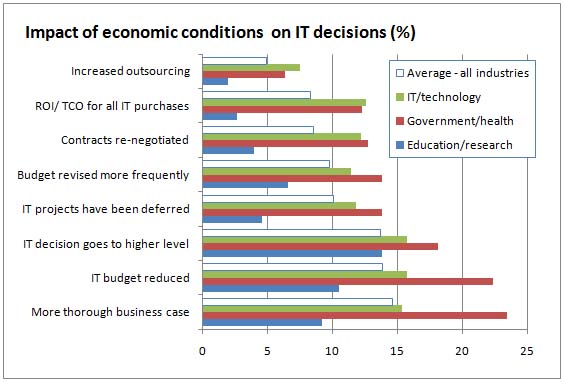GFC's impact on IT: more bureaucracy

The economic conditions of the last year seem to have encouraged more report writing and greater justification for expenditure, but shouldn't that have been happening anyway?
The upshot of the global financial crisis (GFC) is that more Australian and Kiwi IT managers are being called on to produce thorough business cases to support intended technology investments. Of the 1310 Australian and Kiwi IT professionals surveyed in the ZDNet 2010 IT Priorities study, 15 per cent said the GFC had been a major impact on the need for more thorough business cases, with a further 28 per cent claiming it had "some effect".
What's interesting is that the shift seems much stronger in the government and health sectors, where only 27 per cent said the GFC had no impact on the need for a business case. Surely any business would want to ensure an investment decision is the best one, but perhaps the public sector has to work harder to support the case with formal documents that will ultimately sit in a filing cabinet somewhere. That's probably why this sector was most likely to see decision making now being pushed to a higher level.

Being forced to push decision making up the ranks is bad news for IT managers. As a reader commented in "Cold call the boss, not the IT manager", this can waste time and money as the IT expert has to explain things to people who don't have a grip on the required level of detail.
The other significant issue is the continual revising of budgets. Technology is rarely a short-term fix and it's the blight of IT managers to have to continually re-prioritise projects on the go because budgets are being moved around. Thirty-nine per cent of respondents said the GFC had some effect here, but again, the effect was considerably higher (47 per cent) in the government and health sector.
The business service sector, by contrast, seems to have had an easier time of it. They tend to be smaller operators who will have shorter processes and more rigour in their decision making. The need for a more thorough business case is one third less likely to be a major issue. The same goes for the frequent reassignment of IT budgets.
Despite all the extra paperwork from more detailed business cases, plus all the budgeting and re-budgeting, health and government was the sector least likely to be impacted by cuts in budget. So doesn't that sound like a lot of wasted time and energy? It would be interesting to see if the efficiency of IT departments drops during times of economic hardship simply because of last minute checks and balances that achieve little except to add to the bureaucracy.